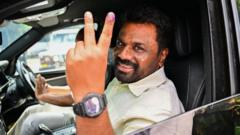Sri Lanka has witnessed a remarkable political shift as President Anura Kumara Dissanayake's National People's Power (NPP) coalition emerged victorious in the country's snap parliamentary elections, securing a two-thirds majority with 159 seats. This victory follows Dissanayake's election in September, where he pledged to tackle corruption and restore stability in a nation grappling with its worst economic crisis to date. The high cost of living and economic hardship were pivotal issues that drove voters towards Dissanayake's left-leaning alliance.
Analysts had anticipated a strong performance from the NPP, but there was uncertainty regarding the margin of victory and the potential to secure the desired two-thirds majority for ambitious reforms. Previously, Dissanayake's Janatha Vimukthi Peramuna (JVP) held just three seats in the outgoing assembly. Aged 55, Dissanayake characterized this election as essential, indicating its potential to significantly alter Sri Lanka's trajectory.
The opposition alliance, led by Sajith Premadasa, was seeking to reclaim power after Dissanayake's recent presidential win. Following his election, Dissanayake called for snap elections, arguing that a new parliament reflecting the people's will was necessary. A notable statistic is that nearly two-thirds of former MPs chose not to contest, including influential members from the former ruling Rajapaksa family. Of the 225 parliamentary seats, 196 were directly elected, supplemented by party-nominated MPs based on proportional representation.
Sri Lanka's current crisis can be traced back to skyrocketing inflation, fuel shortages, and food insecurity, culminating in the ousting of former President Gotabaya Rajapaksa. Ranil Wickremesinghe, Rajapaksa's successor, secured a $3 billion bailout from the International Monetary Fund, but the economic situation remains bleak for many citizens. For instance, garment factory worker Manjula Devi, employed in the Katunayake Free Trade Zone, expressed ongoing struggles, stating, "We are still stuck with the problems we faced before."
Over the last four years, the poverty rate in Sri Lanka has surged to 25.9%, and the World Bank predicts only a 2.2% growth rate for 2024. Dissanayake's political ascension has been fueled by discontent with established leaders, as Sri Lankans seek alternatives promoting strong state intervention and lower taxes through leftist economic policies.
Notably, Dissanayake is the first Sri Lankan president elected with less than 50% of the vote, yet many observers believe his coalition will perform better in these elections. The fate of the new government will depend, in part, on a fragmented opposition that has seen leaders and parties splinter into smaller factions or contest independently. The JVP-led alliance's energetic campaign style has differentiated them significantly from the opposition.
With this newfound power, the NPP coalition faces immense pressure to deliver on campaign promises, which include debt repayment, political reform, and accountability for previous administrations regarding corruption. As Sri Lanka continues to navigate its precarious economic landscape, the new government must prioritize essential goods and services to uphold public trust and support. The forthcoming period presents a significant test for Dissanayake's administration as it endeavors to reshape the future of Sri Lanka.




















